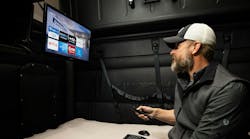"Trucking will reign as the ideal mode of freight transportation."
The North American trucking industry transformed itself in the last decade of the 20th century in response to the phenomenal freight transportation demand created by an economy virtually uninterrupted by downturn or recession. Because trucking has so closely woven itself into the successful North American economic infrastructure, our continent's fleet will grow at a rate about equal to the economy's growth rate. Within the first five years of the next century, the number of trucks on North America's highways will increase by between 700,000 and 900,000. By 2005, there will be over 3.5-million Class 8 trucks on the road.
This growth dynamic will continue to drive dramatic change for the entire transportation industry, from shippers and carriers to truck manufacturers and component suppliers.
Trends that will affect and shape trucking in the 21st century include the following:
* The demand for drivers will become even more acute. Carriers will use a host of new competitive tools to attract drivers so their own growth is not stunted. Among them will be more technology on trucks, enhanced wages and driving conditions, safety equipment, entertainment and communications options, and a wider spectrum of non-wage benefits.
* Information technology will reshape freight transportation, productivity and efficiency definitions, competition, trucks and truck design, companies, communities . . . in short our entire way of living and doing business.
* The Internet will transform distribution patterns of consumers as e-commerce accelerates the speed of freight delivery.
* On the truck operations side, we will move from a passive monitoring of vehicle location and truck performance status to a system of predicting where the driver/truck must be at some future time, and also predicting system maintenance. Trailer and load monitoring will grow as carriers and shippers demand more information about their assets and product.
* Truck manufacturers will have to provide an integrated communications platform to deliver information about the truck and driver that is linked with a fleet's communications and logistics platform.
* Vehicle service and support will continue to be our most critical objective as truck manufacturers. In fact, truck sales of the future will be based on guaranteed uptime rather than miles used per truck. This trend will require a comprehensive supply-chain program and highly computerized support methods. It also will require truck manufacturers to establish a comprehensive service infrastructure that is highly interactive with drivers, service technicians, and fleet management alike.
* Truck safety will remain at the forefront of public consciousness. We must work diligently as an industry to advance new safety technology and seek to remove existing economic disincentives to purchase it on new trucks. New safety systems such as electronic brakes, stability warning and control and collision warning systems will be the rule, rather than the exception, on the trucks of the future.
Finally, despite the complex challenges facing the industry in the 21st century, trucking will reign as the ideal mode of freight transportation to service a just-in-time manufacturing and distribution environment intensified by e-commerce.
Truck fleets and truck operators that successfully harness information technology, proactively pursue safety, creatively manage drivers, and effectively manage their costs will thrive in the next millennium.


